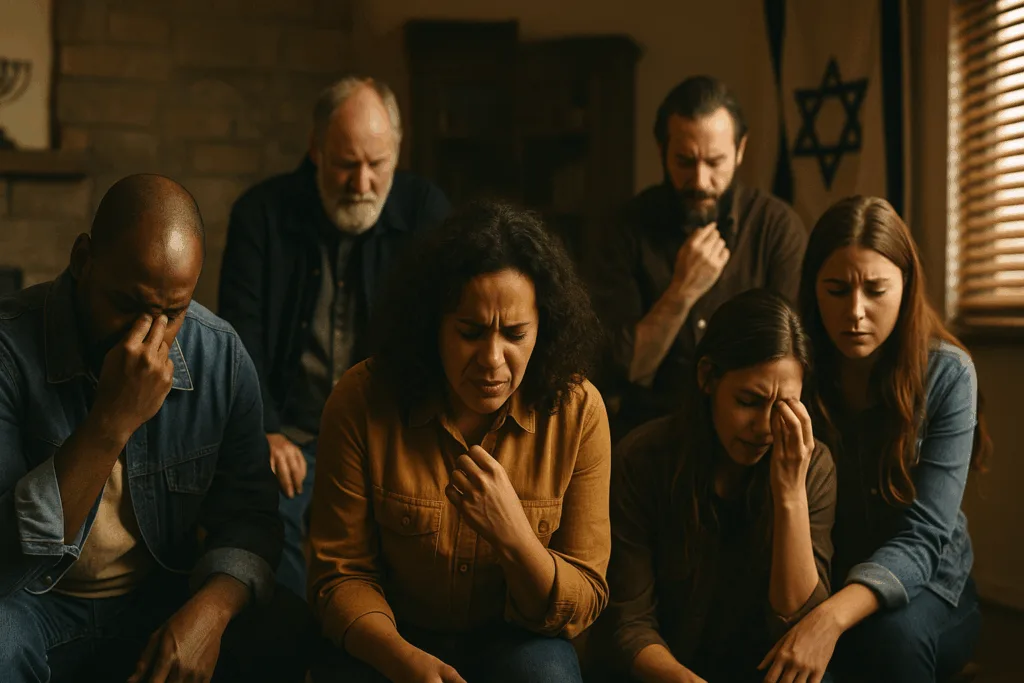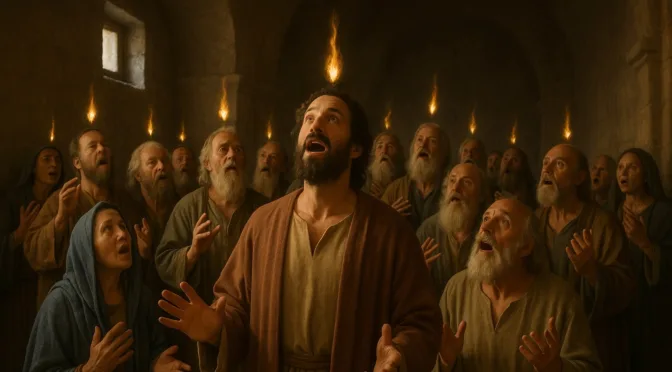A First-Hand Pentecost Vision
I saw it in a vision.
The Lord opened my eyes, and I stood among them, unseen yet present. I could feel the weight of the room—the thick air, the groaning of souls. It was as if I had been carried back through time, placed within the trembling walls of the upper room, where one hundred and twenty waited. Their faces were worn, desperate. Their knees pressed into the cold stone, and the air crackled with a hunger words could not express.
The walls, ancient and heavy with the dust of centuries, seemed to lean in with the prayers. I watched as lips moved without sound, tears ran unashamed, and hands gripped the hem of heaven itself. The Lord had told them: “Stay in the city until you are clothed with power from on high” (Luke 24:49, NASB). And so they waited—not with passivity, but with a fervent, breaking cry.
The sun climbed higher, pouring light through small windows, illuminating swirling motes of dust. The scent of sweat and worn garments filled the air. Yet no one moved for food, no one reached for water. Their thirst was for God alone. I watched a woman collapse against the floor, her face pressed into the stone, whispering one word over and over: “Abba.”
It was not a gathering of the strong. It was an altar of the broken.

Time passed. Hours. The desperation deepened until it was almost a sound itself—a low hum of hunger in the spirit. Peter knelt with his face buried in his hands, his shoulders shaking. I could hear his low plea, “Lord, we have nothing left but You.”
That’s when it came.
A sound—first distant, like a storm gathering beyond the hills—then rushing inward, swift and mighty. It was not the wind of earth but the breath of heaven (Acts 2:2). The stones underfoot trembled. Garments fluttered as if caught in a gale, though the air was still.
The roar filled every corner.

And then, fire.
It appeared, bright as the sun, fierce and holy. Tongues of flame, living and alive, danced above each head (Acts 2:3). Yet it did not burn. It filled. I saw it—how it sank into them, how their faces lifted, eyes wide, mouths opening with sounds no man had taught them.
The Spirit Himself had come.
They spoke in languages of men and angels. Words of praise, of glory, of the mighty deeds of God poured from their lips. Some wept, undone. Others lifted their hands, faces shining. Some laughed with a joy deeper than any suffering they had known (Nehemiah 8:10). The fire had not only touched them—it claimed them.
I watched as the Spirit pressed them outward, stumbling into the streets. The city gathered quickly, drawn by the uproar. Men from every nation under heaven stared in wonder as these simple, broken vessels proclaimed the glory of God in languages not their own. Parthians, Medes, Egyptians, Romans—all heard the wonders of God in their own tongue.
And then Peter—bold, blazing—stepped forward. I heard his voice, strong and certain, rise above the clamor:
“Repent, and each of you be baptized in the name of Jesus Christ for the forgiveness of your sins; and you will receive the gift of the Holy Spirit” (Acts 2:38, NASB).
The fire leapt from heart to heart.
Three thousand souls were swept into the kingdom that day.
And still, as I stood there, unseen but seeing, I knew: this was not the end. The fire was not meant for one day, one room. It was a beginning. A first spark of a blaze that would run to the ends of the earth.
I could feel it even as the vision faded—the fire has never gone out. It burns still. And for those who dare to wait, who dare to hunger, the Spirit will fall again.
Prayer:
O Lord God, El Shaddai, let us be among those who hunger for You with all our hearts. Pour out Your Spirit anew, ignite the fire within us. May we lay down every burden, every pride, every sin, until only You remain. Come, Holy Spirit, breathe on us. Let the sound of heaven once again fill our hearts and homes. In the mighty name of Yeshua, we pray. Amen.
⸻


